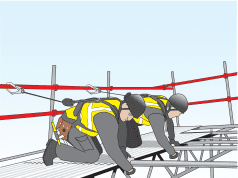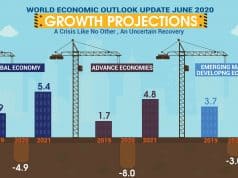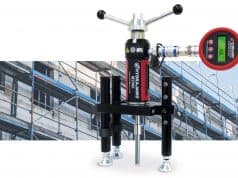Scaffmag Editor Daniel Norton sat down with ScaffPlan directors Simon Boyes and Ben Beaumont to find out where the company is heading and how it plans to continue transforming the scaffolding industry. With major updates and new product releases on the horizon, Boyes and Beaumont shared insights on ScaffPlan’s growth, upcoming software features, and their vision for the future of scaffold design.
ScaffPlan was born out of necessity in 2020 when Simon Boyes, a scaffolding expert and former owner of Benchmark Scaffolding, saw a need for a more efficient, accurate, and user-friendly solution to scaffold design.
Frustrated by the limitations of existing platforms, Boyes envisioned a solution that could simplify the design process while maintaining millimetre-level precision. What started as an internal tool for Boyes’ scaffolding business quickly evolved into ScaffPlan, a powerful scaffold design platform integrating advanced 3D modelling and Building Information Modelling (BIM).
In March 2024, Simon Boyes made a pivotal decision by selling Benchmark Scaffolding to focus entirely on the development and growth of ScaffPlan. His commitment to pushing the boundaries of scaffold design technology solidified ScaffPlan’s position as an industry leader, enabling Boyes to dedicate his full energy toward transforming how scaffolders plan, design, and manage their projects.
The Beginnings: Addressing Industry Needs
Simon Boyes’ experience running one of Australia’s largest scaffolding contractors highlighted the inefficiencies inherent in the design process. The scaffold design team and project managers at Benchmark struggled with cumbersome, outdated software that was often too complex or insufficient for the real-world demands of scaffold construction. Recognising the need for a better solution, Boyes and his team set out to build a platform that was intuitive enough for the scaffolding team on site, powerful enough for complex projects, and detailed enough for design engineers.
“We’ve used every design platform on the market, and some of them are really good at some things, but not so great at others. We wanted to build a platform that was easy to use but super accurate and detailed,” Simon explains.
ScaffPlan delivered on that promise, offering users a 3D modelling solution with parametric modelling tools and with built-in engineering capability that enabled users to design faster, more precisely, and with fewer errors.
“At Benchmark we had our scaffold teams using ScaffPlan in the field on their phone, collaborating directly with the design team, who made updates or client-led revisions in real time. Everyone could use it effectively and it made us more efficient.”

Expansion and New Features
Earlier this year, ScaffPlan launched Version 1.7, which introduced a host of new features aimed at increasing flexibility and usability.
Key among these updates was its expanded system scaffold range, which allows scaffolders to work with systems such as Altrad Futuro, Metrix, Scafom-Rux, and HAKI Universal – taking the total number of supported systems to sixteen.
Notable for many UK readers was the update of the tube and fitting tools in ScaffPlan, making them faster and much easier to use.
ScaffPlan’s ‘ScaffBlock’ feature is a new tool that simplifies the creation of reusable parametric blocks by the user from any combination of items that can be used over and over in their designs.
“The ScaffBlock tool is one of my favourites, it works really nicely with all scaffolding and is especially powerful for tube and fitting”, explains Boyes. “You can model anything you like, such as a lift of scaffolding, define the properties that you’d like to be able change each time, such as the number of inside boards or transom centres, and then save it and use it over and over again”.
We should also not forget Phase Manager, a feature that enables users to manage different project phases more efficiently and link them to gear lists, sequence drawings and animations.
These additions solidified ScaffPlan’s position as a comprehensive solution for scaffold design, safety checks, and project management, making it indispensable for both large-scale and smaller projects.
“If ‘a picture speaks a thousand words’ then a ScaffPlan model speaks a million!” – Ben Beaumont.
ScaffPlan’s journey took another pivotal turn at the beginning of this year with the appointment of Ben Beaumont as Director. Beaumont, a respected figure in the UK’s scaffolding and temporary works sectors, brings over two decades of experience and a deep understanding of the industry. His appointment marks a new era for ScaffPlan as it expands its reach globally and enhances its leadership in scaffolding technology.
Beaumont’s expertise in scaffolding and temporary works combined with an entrepreneurial background, which came from founding and leading 48.3, a scaffolding design and training consultancy and years of leading the Temporary Works Forum (TWf), align with ScaffPlan’s mission to innovate and revolutionise the scaffolding sector. Together, Boyes and Beaumont are committed to transforming scaffolding design and project management by pushing the boundaries of what’s possible with technology.
“We now have a unique opportunity to change how scaffolding and temporary works are conceived, designed, collaborated on, and executed. The potential for positive change is huge, and that’s really exciting,” Beaumont said.

Where ScaffPlan is Headed
As ScaffPlan continues to evolve, Boyes and Beaumont revealed that the company is working on several exciting new additions to the platform, set to launch in Q1 of 2025. The most notable of these innovations is a new version of the software.
“We’re taking all the power of our existing design platform and putting it into a simpler, easier-to-use, and much cheaper solution,” says Boyes. “This is targeted at a wider audience who will benefit from the ease of use and accessibility.”
The new version will bring accurate and flexible 3D modelling capability to a wider industry audience through the automated tools that ScaffPlan includes. Estimators, contract managers, and supervisors, who would all benefit from the improved communication and planning that this 3D capability offers, will now be able to include it in their tenders and planning documents, improving their professionalism and helping them win more work.
Beaumont said, “It is important that we make our tools accessible for everyone so that collaboration can happen more effectively – scaffold teams, designers and project stakeholders all working together seamlessly. The quality and effectiveness of communication between everyone will improve, and that will drive efficiency and reduce mistakes.”
In addition, ScaffPlan is also developing a bespoke Customer Relationship Management (CRM) system designed specifically for scaffolders and the construction industry. This CRM will allow scaffolding companies to track leads, deals, and quotes, essentially offering a platform that can be used to run their business.
The software is designed to seamlessly integrate with the existing design tools, creating a fully unified system for managing both the technical and business sides of scaffolding operations.

ScaffPlan’s Vision for the Future
With its continued commitment to innovation, ScaffPlan is poised to remain at the forefront of the construction technology sector. The upcoming launch of its new version and CRM system highlights the company’s dedication to making scaffold design and management more accessible to businesses of all sizes. By combining 3D modelling, BIM, and now business management tools, ScaffPlan is positioned to reshape the way scaffolding companies design, plan, and manage their projects.
“For me it’s about how effectively we all work together – key to doing that is communication. If ‘a picture speaks a thousand words’ then a ScaffPlan model speaks a million!” said Beaumont. “Printed 2D drawings will be gradually replaced by fully interactive 3D models, some of our customers are doing this now. They’ve experienced the benefits of transition to 3D on collaboration and communication, and now their customers want it on every project.”
The ScaffPlan team are focused on creating a future where scaffolding businesses, large and small, can leverage cutting-edge technology to improve safety, efficiency, and productivity.
“We want to ensure that every scaffolder has access to the tools they need to be successful, whether they’re a large company working on industrial sites or a smaller operation focused on residential projects,” Boyes explains.

Shaping the Future of Scaffold Design
Having seen a first-hand demonstration of ScaffPlan, I was blown away by the level of detail in the 3D models and its effortless simplicity to navigate—even the smallest of details were crystal clear. I’m confident that if any scaffolding contractor were to show this model to a potential client, they would immediately understand what is set to be built. This level of clarity is transformative for the industry, bridging the gap between design intent and real-world execution.
ScaffPlan’s journey from inception to its current status as an industry leader is a testament to Simon Boyes’ vision and the company’s unwavering commitment to innovation. With the upcoming releases, including the light version and a custom-built CRM system for scaffolders, ScaffPlan is set to transform how the industry operates.
As someone who’s had the privilege of witnessing the platform’s capabilities first-hand, I’m convinced that ScaffPlan is paving the way for a future where scaffold design is more accessible, efficient, and collaborative than ever before. The scaffolding industry is evolving, and with tools like ScaffPlan, that evolution is set to be faster, smarter, and more impactful for everyone involved.
This article was originally published in Issue 23 of the ScaffMag magazine.


















